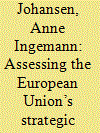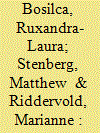| Srl | Item |
| 1 |
ID:
155693


|
|
|
|
|
| Summary/Abstract |
This article argues that the European Union’s capacity to use an operational instrument for the purpose of an articulated objective constitutes an important, but conceptually neglected and empirically underexplored, element of its actorness. In order to fill this gap, the article introduces the concept of strategic capacity and develops an analytical framework for systematic empirical assessments thereof. Drawing on 22 qualitative expert interviews, the framework is applied to the EU’s maritime operation against human smugglers in the Central Mediterranean (EUNAVFOR MED Operation Sophia). The article finds that the EU so far has displayed a fairly low degree of strategic capacity in its fight against human smugglers. The article argues that this fairly low degree of strategic capacity is not to be ascribed to an institutional apparatus that is unfit for strategic action, but a decision on the part of political decision-makers to give weight to symbolic, as opposed to strategic, action. As a result, the operation has contributed little to the formal objective of disrupting and dismantling human smuggling networks in the Central Mediterranean. In some areas, it has even had an adverse effect on this objective.
|
|
|
|
|
|
|
|
|
|
|
|
|
|
|
|
| 2 |
ID:
177998


|
|
|
|
|
| Summary/Abstract |
Why did the European Union (EU) launch a naval operation in response to the migration crisis, despite the humanitarian character of the challenge at hand, doubts about the effectiveness of a military response, and the EU’s traditional focus on civilian means? Integrating institutionalist theory and the literature on crisis response, this article argues that EUNAVFOR MED Operation Sophia is an example of copying through contingent learning wherein the EU’s response to the migration crisis was shaped by naval missions Operation Mare Nostrum and Operation Atalanta. While the former set a precedent for a naval response to migration in the Mediterranean, the latter provided an off-the-shelf institutional blueprint for the design and implementation of Operation Sophia. In a crisis situation characterised by high uncertainty, and with little time to rethink policies or to create new structures, EU political actors used contingent learning to quickly evaluate potential policy responses and institutional reforms, leading them to the decision to copy past institutional designs and practices previously considered successful. This finding has relevance beyond the case of Operation Sophia, as it contributes to a better understanding of why a particular type of policy or action is chosen in times of crisis and urgency.
|
|
|
|
|
|
|
|
|
|
|
|
|
|
|
|